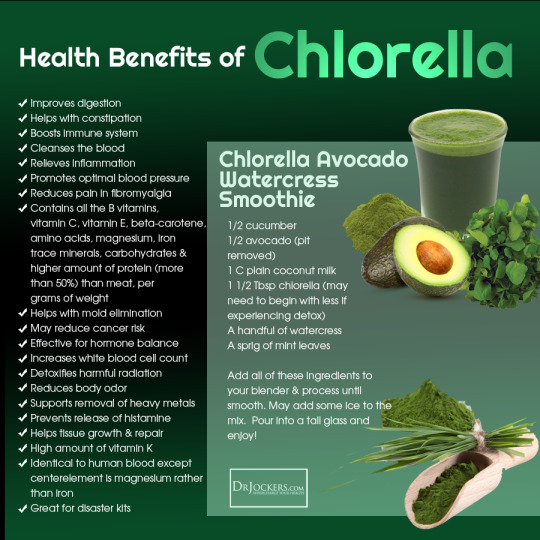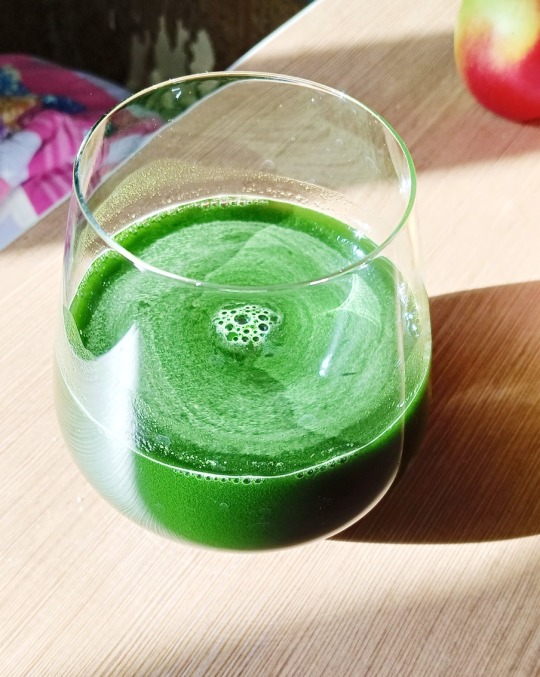#Chlorella
Text

Pear Bliss Balls (Vegan)
#vegan#snacks#bliss balls#pears#oats#dates#almonds#pecans#cinnamon#allspice#chlorella#cacao#mint#lemon#coconut sugar
13 notes
·
View notes
Link
Chlorophyll derived from Chlorella inhibits dioxin absorption from the gastrointestinal tract and accelerates dioxin excretion in rats.
Abstract
We investigated the effects of chlorophyll derived from Chlorella on gastrointestinal absorption of seven types of polychlorinated dibenzo-p-dioxin (PCDD) and 10 types of polychlorinated dibenzofuran (PCDF) in Wistar rats. Twenty-eight rats were randomly distributed into seven groups (n = 4). After overnight food deprivation, rats were given 4 g of the basal diet or 4 g of the chlorophyll diet containing 0.01-0.5% chlorophyll one time on day 1; each diet also contained 0.2 mL PCDD and PCDF standard solutions. The amounts of fecal excretion of PCDD and PCDF congeners from days 1 to 5 in the group fed 0.01% chlorophyll were 64.8% for 1,2,3,7,8-pentaCDD, 78.6% for 1,2,3,4,7,8-hexaCDD, 73.5% for 1,2,3,6,7,8-hexaCDD, 58.5% for 1,2,3,7,8,9-hexaCDD, 33.3% for 1,2,3,4,6,7,8-heptaCDD, 85.7% for 1,2,3,7,8-pentaCDF, 77.3% for 2,3,4,7,8-pentaCDF, 88.6% for 1,2,3,4,7,8-hexaCDF, 78.0% for 1,2,3,6,7,8-hexaCDF, 62.5% for 1,2,3,7,8,9-hexaCDF, 84.1% for 2,3,4,6,7,8-hexaCDF, 41.7% for 1,2,3,4,6,7,8-heptaCDF, and 40.0% for 1,2,3,4,6,7,8-heptaCDF greater (p < 0.01) than those of the control group, respectively. The fecal excretion of PCDD and PCDF congeners was remarkably increased along with the increasing dietary chlorophyll. The amounts of PCDD and PCDF congeners in rats on day 5 administered dioxin mixtures were lower in the 0.01% chlorophyll group than in the control group, ranging from 3.5 to 50.0% for PCDD congeners and from 3.7 to 41.7% lower for PCDF congeners, except for 2,3,7,8-tetrachlorodibenzofuran. The amount of PCDD and PCDF congeners in rats was remarkably decreased along with the increasing dietary chlorophyll. These findings suggest that chlorophyll is effective for preventing dioxin absorption via foods.
5 notes
·
View notes
Text
#Matchatea#Antioxidant#Turmeric#Anti-inflammatory#Açai#aging#Chlorella#detox#Chia#Laxative#constipation#Moringa#heart#immunesystem#CamuCamu#vitaminC#Maca#Naturalaphrodisiac#Reishi#Noni#anticancer#healthyrecipes#recetasaludables
3 notes
·
View notes
Text

Chlorella is packed with nutrients.
While the research on chlorella’s potential to positively impact specific aspects of health still has a ways to go, one thing we do know is that it’s a nutritional powerhouse, and that the ones it contains do confer benefits. Chlorella is a source of:
Vitamin D
Vitamin B12
Folate
Iron
Carotenoids
Antioxidants
Omega-3 fatty acids
Protein
“Chlorella contains vitamin D and B12, which are two nutrients that aren’t found in many plant-derived foods,” says Shaw, and its higher folate and iron levels are also notable.
Chlorella may target free radicals.
Carotenoids are important antioxidants, and you may recognize them as the plant compounds that give fruits and vegetables their orange or yellow hues (in this case, chlorella’s chlorophyll content pushes its hue all the way green). The carotenoids in chlorella may help rid the body of free radicals, which left unchecked can do damage and lead to the development of chronic diseases such as heart disease, diabetes and cognitive conditions, Shaw says.
Chlorella may support immunity.
“We know vitamin D has a connection with strong immune health, and one study found that chlorella may have the potential to enhance immunity,” says Shaw, but more research is needed to determine which form and dose would be most beneficial. In general, vitamin D plays a role in regulating the immune system and has anti-inflammatory properties; keeping tabs on inflammation allows your immune system to function better.
Chlorella is a complete protein.
Not all protein sources are created equal — some are complete proteins, which contain all nine essential amino acids that our body can’t produce on its own, and (you guessed it!) incomplete proteins only have some of those amino acids.
Since chlorella is type of complete protein, it contains those amino acids that create the building blocks for bone, tissue, and muscle formation.
Chlorella may support eye health.
While there haven’t been specific studies conducted to explore chlorella and vision health, research shows that carotenoids, specifically lutein, may help improve age-related macular diseases or prevent their development in the first place — and chlorella is a source of these eye helpers, says Shaw.
Chlorella fights inflammation.
The vitamins, minerals, antioxidants and omega-3s that chlorella contains are known to have ant-inflammatory properties. Chronic inflammation can damage cells over time and is associated with the development of chronic diseases such as obesity, heart disease, diabetes, arthritis, cancer and neurodegenerative diseases like Alzheimer’s.
Chlorella may promote good heart health.
Clinical research on the potential impact of chlorella on heart health is needed , however the algae is a source of omega-3 fatty acids, which we know are part of a heart-healthy diet. Omega-3s are thought to support a healthy heart by decreasing levels of triglycerides (fats) in the blood, lowering blood pressure slightly, and taming inflammation.
Chlorella may contribute to healthy blood.
Chlorella contains three nutrients that are crucial for the formation of red blood cells: iron, folate and vitamin B12. Blood is what carries oxygen all throughout your body so that your organs, muscles and more can function as they should.
Chlorella powders can be added to smoothies, soups and even dips like guacamole or hummus. Whether choosing a supplement in powder, capsule, extract or tablet form, look for reputable companies that do third-party testing. More in-depth reading > here.

#chlorella#health#mental health#immune system#nervous system#inflammation#detox#nutrition#food#diet#superfoods#inspiration#consciousness#blood health#blood pressure#chronic illness#antioxidants#vitamins
0 notes
Text
Did You Know?
Nutritional Benefits of Micro Algae: Dunaliella Salina and Chlorella
Microalgae, tiny photosynthetic organisms, have garnered significant attention for their extraordinary nutritional profiles and potential health benefits. Among the diverse species, Dunaliella salina and Chlorella stand out due to their unique nutrient compositions and health-promoting properties. Glaukos Algae, a pioneering company in the cultivation of microalgae, focuses on producing high-quality Dunaliella salina and Chlorella to harness their full potential. Visit their website at glaukosalgae.com for more information.
Dunaliella Salina: The Carotenoid Powerhouse
Dunaliella salina is renowned for its exceptional ability to produce high levels of carotenoids, particularly beta-carotene. This microalga thrives in extreme environments such as salt pans, where high salinity and intense sunlight contribute to its robust nutrient profile.
Nutritional Composition:
Beta-Carotene: Dunaliella salina is one of the richest natural sources of beta-carotene, a powerful antioxidant and a precursor to vitamin A. Beta-carotene supports vision health, immune function, and skin health.
Proteins: It contains essential amino acids that contribute to muscle repair, immune function, and overall cellular health.
Lipids: The alga is a source of essential fatty acids, which are crucial for brain health and inflammatory response regulation.
Minerals: It provides essential minerals such as magnesium, potassium, and iron, which are vital for numerous bodily functions, including enzyme activity and oxygen transport.
Health Benefits:
Antioxidant Protection: The high beta-carotene content in Dunaliella salina helps neutralize free radicals, reducing oxidative stress and protecting cells from damage.
Immune Support: Beta-carotene and other phytonutrients in Dunaliella salina enhance immune system function, helping the body fend off infections and diseases.
Skin Health: Beta-carotene contributes to healthy skin by promoting cell regeneration and protecting against UV-induced damage.
Chlorella: The Nutrient-Dense Superfood
Chlorella is a green microalga known for its impressive nutrient density and detoxifying properties. It is often used as a dietary supplement due to its wide array of vitamins, minerals, and bioactive compounds.
Nutritional Composition:
Chlorophyll: Chlorella is exceptionally high in chlorophyll, which aids in detoxification and supports liver health.
Proteins: It contains a substantial amount of high-quality protein, making it an excellent source for vegetarians and vegans.
Vitamins: Chlorella is rich in vitamins such as B-complex (including B12), C, and E, which are essential for energy production, immune support, and antioxidant protection.
Minerals: It provides important minerals like iron, calcium, magnesium, and zinc.
Omega-3 Fatty Acids: Chlorella contains significant amounts of omega-3 fatty acids, beneficial for heart health and cognitive function.
Health Benefits:
Detoxification: The chlorophyll in Chlorella binds to heavy metals and toxins, aiding in their elimination from the body and supporting overall detoxification.
Immune Boost: Its rich nutrient profile strengthens the immune system, enhancing the body's natural defense mechanisms.
Digestive Health: Chlorella promotes a healthy digestive system by supporting the growth of beneficial gut bacteria and improving bowel regularity.
Energy and Vitality: The high concentration of vitamins, minerals, and proteins helps improve energy levels and overall vitality.
Glaukos Algae: Leading the Way in Micro Algal Cultivation
Glaukos Algae, based in the Nellore district of Andhra Pradesh, India, is at the forefront of sustainable microalgae cultivation. Established in Q4 of 2019, the company focuses on growing and harvesting high-quality Dunaliella salina and Chlorella through a 100% organic and sustainable approach. Their state-of-the-art facility ensures that the microalgae retain their full nutritional potential, making them a valuable addition to the health and wellness industry.
Glaukos Algae's commitment to sustainability and quality is evident in their meticulous cultivation practices and innovative techniques. By leveraging the natural environment and optimizing growth conditions, they produce microalgae that are rich in essential nutrients and free from contaminants.
For more information about Glaukos Algae and their products, visit their website at glaukosalgae.com.
Conclusion
Microalgae such as Dunaliella salina and Chlorella offer remarkable nutritional benefits that can significantly enhance overall health and well-being. Companies like Glaukos Algae are leading the way in harnessing the power of these tiny yet potent organisms, providing high-quality, nutrient-rich microalgae to support a healthier lifestyle. Whether you're looking to boost your antioxidant intake, support detoxification, or improve your overall nutrient profile, incorporating Dunaliella salina and Chlorella into your diet can offer substantial health benefits.
1 note
·
View note
Text

Energetyzująca zielona barwa* kremu Larens Lifting Detox+ Face Cream to zasługa chlorofilu z dobroczynnych ekstraktów z alg - spiruliny i chlorelli. Chlorofil, nazywany „naturalną zieloną energią”, odtruwa, oczyszcza, witalizuje komórki. Dlatego Lifting Detox+ Face Cream jest idealny dla skóry 21. wieku, narażonej na stres, zanieczyszczenia, słabe odżywienie.
Dwie algi to nie tylko podwójna moc antyoksydacji i detoksykacji. Dostarczają skórze porcję ożywczych elektrolitów, minerałów i witamin. Skóra jest pobudzona do regeneracji na poziomie komórkowym, rozświetlona, oznaki zmęczenia są zredukowane, a koloryt zdrowy i wyrównany.
#larens#larensliftingdetoxfacecream#Larens#LiftingDetox#KremDoTwarzy#ZielonaEnergia#Chlorofil#EkstraktyZAlgi#Spirulina#Chlorella#Antyoksydacja#Detoksykacja#Minerały#Witaminy#RegeneracjaSkóry#Rozświetlenie#OżywienieSkóry#ZdrowaSkóra#NaturalnaPielęgnacja
0 notes
Text
Chlorella Spirulina supplement that may lower high cholesterol
Chlorella has long been called the “Green Gem of the Orient” because of its many nutritional benefits. This single-celled, microscopic plant grows in a monitored and clean fresh water environment. As one of the world’s oldest known foods. Chlorella Spirulina contains a wide range of vitamins, minerals, essential fatty acids, enzymes, chlorophyll, RNA/DNA, CGF, and much more. It is a whole food…

View On WordPress
0 notes
Text
Chlorella💚💚💚 is a single-celled green algae rich in nutrients.
It contains:
Protein: all 9 essential amino acids,
Vitamins: A, B1, B2, B3, B6, B12, C, E, K,
Minerals: iron, calcium, magnesium, potassium, zinc,
Antioxidants: chlorophyll, lutein, zeaxanthin.
«««««««««««««««««««««««««««««««««««««««
Хлорелла💚💚💚 – это одноклеточная зеленая водоросль, богатая питательными веществами.
Она содержит:
Белок: все 9 незаменимых аминокислот,
Витамины: A, B1, B2, B3, B6, B12, C, E, K,
Минералы: железо, кальций, магний, калий, цинк,
Антиоксиданты: хлорофилл, лютеин, зеаксантин.

0 notes
Text
Chlorella pro čistotu střev, detoxikaci a posílení imunity
1. Čistota střev a detoxikace
Chlorella obsahuje vysoké množství chlorofylu, což jí dává tmavě zelenou barvu a schopnost absorbovat toxiny. Tato schopnost pomáhá čistit střeva od nahromaděných odpadních látek, což příspívá ke svěžímu pocitu lehkosti. Pravidelná konzumace chlorelly působí jako jemné vnitřní čištění, které podporuje optimální funkci trávicího systému.
2. Posilování imunity
Zdravá…

View On WordPress
0 notes
Text
Chlorella and Spirulina Health Benefits
#natural health#foods#nutrition#chlorella#spirulina#links#health#holistic#wellness#natural#lifestyle#food
0 notes
Text

Dream Lattes (Vegan)
#vegan#drinks#moon milk#plant milk#multi#beet powder#turmeric#matcha#chlorella#ashwagandha#blue spirulina#cinnamon#cardamom#nutmeg#ginger#coconut oil#peppermint#lemon#maple syrup#eat the rainbow
44 notes
·
View notes
Link
Chlorella Accelerates Dioxin Excretion in Rats
Abstract
We investigated the effects of Chlorella on fecal excretion of polychlorinated dibenzo-p-dioxin (PCDD) congeners and polychlorinated dibenzofuran (PCDF) congeners in Wistar rats administered the rice oil that caused Yusho disease, as a substitute for purified dioxin. The rats were fed 4 g of a control diet or a 10% Chlorella diet containing 0.2 mL of the rice oil once during the 5-d experimental period. The amounts of PCDD and PCDF congeners excreted in feces from d 1 to 5 in the group fed 10% Chlorella were 0.2–11.3 and 0.3–12.8 times greater (P < 0.05), respectively, than those of the control group. We then investigated the fecal excretion of PCDD and PCDF congeners from d 8 to 35 in rats administered 0.5 mL of the rice oil. Rats consumed the basal diet for 1 wk. After 1 wk, they consumed either the basal diet or the 10% Chorella diet. The fecal excretions of PCDD and PCDF congeners in the group fed 10% Chlorella were 0.3–3.4 and 0.5–2.5 times greater (most, P < 0.05), respectively, than those of the control group. Thus, the fecal excretions of PCDD and PCDF congeners were greater in rats fed Chlorella. These findings suggest that the administration of Chlorella may be useful in preventing gastrointestinal absorption and for promoting the excretion of dioxin already absorbed into tissues. Moreover, these findings suggest that Chlorella might be useful in the treatment of humans exposed to dioxin.
5 notes
·
View notes
Text
Chlorella is a type of green algae that is packed with nutrients. It is a good source of protein, vitamins, minerals, and antioxidants. Chlorella is also low in calories and fat, making it a healthy choice for people who are trying to lose weight or maintain a healthy weight.
Chlorella has many potential health benefits, including:
Boosts the immune system: Chlorella contains antioxidants and…
View On WordPress
#chlorella#Chlorella benefits#chlorella capsules#chlorella dosage#chlorella for athletic performance#chlorella for blood pressure#chlorella for blood sugar#chlorella for cholesterol#chlorella for detox#chlorella for gut health#chlorella for immunity#chlorella for inflammation#chlorella for muscle growth#chlorella powder#chlorella side effects#chlorella smoothie#chlorella tablets#chlorella weight loss#green algae#superfood
0 notes
Photo

Top 10 der Superfoods mit C!
Als Superfood werden Lebensmittel bezeichnet, die besonders gut für Gesundheit und Wohlbefinden sind. Hier die Top 10 der Superfoods mit C!
#Camu Camu#Canihua#Cantaloupe Melone#Cashewkerne#Champignons#Chia Samen#Chicorée#Chili#Chlorella#Cranberrys#gesund#gesunde Ernährung#Kaniwa#Superfood
0 notes
Text

There's one superfood you may be neglecting: Sea veggies. Sure, you've eaten those bits of seaweed in your miso soup or wrapped around your sushi roll.
However, there is actually a wide variety of green, brown, and red seaweed or edible marine algae that fall into the sea vegetables category. And they are bursting with nutrients, some of which you just can't get from land vegetables.
Includes eight recipes using sea veggies.
#sea vegetables#sea veggies#superfoods#all about#kelp#nori#spirulina#dulse#wakame#chlorella#kombu#omega 3 fatty acids#healthy gut#antioxidant#iodine#ocean greens
1 note
·
View note
